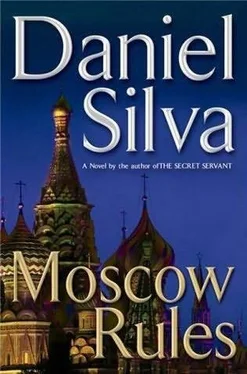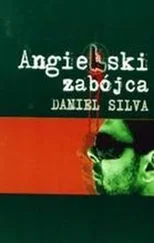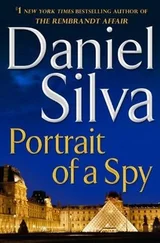“Message received. What else?”
“I’m thinking about giving Sarah Crawford a Russian-American boyfriend. I can do Russian-Israeli on short notice, but not Russian-American. ” Gabriel handed Carter an envelope. “He’ll need a full set of identification, of course, but he’ll also need a cover story that can stand up to the scrutiny of Ivan and his security service.”
They came to Great George Street. Carter paused in front of a newsstand and frowned at the morning papers. Osama bin Laden had released a new videotape, warning of a coming wave of attacks against the Crusaders and the Jews. It might have been dismissed by the professionals of Western intelligence as yet another empty threat had the statement not contained four critical words: the arrows of Allah.
“He’s promising the autumn is going to be bloody,” Carter said. “The fact that he was specific about the timing is noteworthy in itself. It’s almost as if he’s telling us there’s nothing we can do to stop it. On deep background, we’re telling the media that we see nothing new or unusual in the tape. Privately, we’re shitting bricks. The system is blinking red again, Gabriel. They’re overdue for another attack against an American target, and we know they want to hit us again before the president leaves office. Expert opinion is convinced this plot may be the one. All of which means you have a limited amount of time.”
“How limited?”
“End of August, I’d say. Then we raise the terror warning to red and go on war footing.”
“The moment you do, we lose any chance of getting to Elena.”
“Better to lose Elena than live through another 9/11. Or worse.”
They were walking toward the river along Great George Street. Gabriel looked to his right and saw the North Tower of Westminster Abbey aglow in the bright sunshine. The Caravaggio image flashed in his memory again: the man with a gun in hand, firing bullets into the face of a fallen terrorist. Carter had been standing a few yards away that morning, but now his thoughts were clearly focused on the unpleasant meeting he was about to conduct on the other side of the English Channel.
“You know, Gabriel, you get the easy job. All you have to do is convince Elena to betray her husband. I have to go hat in hand to the Frogs and beg them to give you and your team the run of the Riviera.”
“Be charming, Adrian. I hear the French like that.”
“Care to join me for the negotiations?”
“I’m not sure that’s a wise idea. We have a somewhat testy relationship. ”
“So I’ve heard.” Carter was silent for a moment. “Is there any chance of amending your demands to allow the French some sort of operational role?”
“None.”
“You have to give them something, Gabriel. They’re not going to agree otherwise.”
“Tell them they can cook for us. That’s the one thing they do well.”
“Be reasonable.”
Gabriel stopped walking. “Tell them that if we manage to block Ivan’s sale, we’ll be happy to make sure all the credit goes to the French president and his intelligence services.”
"You know something?” Carter said. “That might actually work.”
The conference convened in Paris two days later, at a gated government guesthouse off the Avenue Victor Hugo. Carter had pleaded with the French to keep the guest list short. They had not. The chief of the DST, the French internal security service, was there, along with his counterpart from the more glamorous DGSE, the French foreign intelligence service. There was a senior man from the Police Nationale and his overlord from the Ministry of the Interior. There was a mysterious figure from military intelligence and, in a troubling sign that politics might play a role in French decision making, there was the president’s national security adviser, who had to be dragged to the gathering against his will from his château in the Loire Valley. And then there were the nameless bureaucrats, functionaries, factotums, note-takers, and food tasters who came and went with hushed abandon. Each one, Carter knew, represented a potential leak. He recalled Gabriel’s warnings about an ever-widening circle of knowledge and wondered how long they had until Ivan learned of the plot against him.
The setting was intensely formal, the furnishings preposterously French. The talks themselves were conducted in a vast mirrored dining room, at a table the size of an aircraft carrier. Carter sat alone on one flank, behind a little brass nameplate that read THOMAS APPLEBY, FEDERAL BUREAU OF INVESTIGATION-a mere formality since he was known to the French and was held by them in considerable regard despite the many sins of his service. The opening notes were cordial, as Carter anticipated they would be. He raised a glass of rather good French wine to the renewal of Franco-American cooperation. He endured a rather tedious briefing about what Paris knew of Ivan’s activities in the former French colonies of sub-Saharan Africa. And he suffered through a rather odious lecture by the national security adviser over the failure of Washington to do anything about Ivan until now. He was tempted to lash back-tempted to chastise his newfound allies for pouring their own weapons into the most combustible corners of the planet-but he knew discretion was the better part of valor. And so he nodded at the appropriate times and conceded the appropriate points, all the while waiting for his opportunity to seize the initiative.
It came after dinner, when they retired to the cool of the garden for coffee and the inevitable cigarette. There were moments at any such gathering when the participants ceased to be citizens of their own land and instead banded together as only brothers of the secret world can do. This, Carter knew, was one of those moments. And so with only the faint murmur of distant traffic to disturb the stately silence, he quietly placed Gabriel’s demands before them-though Gabriel’s name, like Ivan’s and Elena’s, was not uttered in the insecurity of the open air. The French were appalled, of course, and insulted, which is the role the French play best. Carter cajoled and Carter pleaded. Carter flattered and Carter appealed to their better angels. And last, Carter played Gabriel’s trump card. It worked, just as Gabriel had known it would, and by dawn they had a draft agreement ready for signature. They called it the Treaty of Paris. Adrian Carter would later think of it as one of his finest hours.
The village of Saint-Tropez lies at the far western end of the Côte d’Azur, at the base of the French département known as the Var. It was nothing but a sleepy fishing port when, in 1956, it was the setting for a film called And God Created Woman, starring Brigitte Bardot. Nearly overnight, Saint-Tropez became one of the most popular resorts in the world, an exclusive playground for the fashionable, the elite, and other assorted euro millionaires. Though it had fallen from grace in the eighties and nineties, it had seen a revival of late. The actors and rock stars had returned, along with the models and the rich playboys who pursued them. Even Bardot herself had started coming back again. Much to the horror of the French and longtime habitués, it had also been discovered by newly rich invaders from the East: the Russians.
The town itself is surprisingly small. Its two primary features are the Old Port, which in summer is filled with luxury yachts instead of fishing boats, and the Place Carnot, a large, dusty esplanade that once each week hosts a bustling outdoor market and where local men still pass summer days playing pétanque and drinking pastis. The streets betweenthe port and the square are little more than medieval passageways. In the height of summer, they are jammed with tourists and pedestrians, which makes driving in the centre ville of Saint-Tropez nearly impossible. Just outside the town center lies a labyrinth of towering hedgerows and narrow lanes, leading to some of the world’s most popular beaches and expensive homes.
Читать дальше












